
The Deobandi movement or Deobandism is a revivalist movement within Sunni Islam that adheres to the Hanafi school of law. It formed in the late 19th century around the Darul Uloom Madrassa in Deoband, India, from which the name derives, by Muhammad Qasim Nanautavi, Rashid Ahmad Gangohi, and several others, after the Indian Rebellion of 1857–58. They consider themselves the continuation of Ahlus Sunnah wal Jamaat. The main purpose of this movement was to reject the grave worshipping, shirk and protect the orthodoxy of Islam from Bidah, as well as the influence of non-Muslim cultures on the Muslim of South Asia. The movement pioneered education in religious sciences through the Dars-i-Nizami associated with the Lucknow-based ulema of Firangi Mahal with the goal of preserving traditional Islamic teachings from the influx of modernist, secular ideas during British colonial rule. The Deobandi movement's Indian clerical wing, Jamiat Ulema-e-Hind, was founded in 1919 and played a major role in the Indian independence movement through its participation in the Pan-Islamist Khalifat movement and propagation of the doctrine of composite nationalism. The movement shares several similarities with Wahhabism.
Darul uloom, also spelled dar-ul-ulum, is an Arabic term that literally means "house of knowledge". The term generally means an Islamic seminary or educational institution – similar to or often the same as a madrassa or Islamic school – although a darul uloom often indicates a more advanced level of study. In a darul uloom, Islamic subjects are studied by students, who are known as talaba or ṭālib.
Muhammad Rafi Usmani was a Pakistani Muslim scholar, jurist and author who served as the President of Darul Uloom Karachi. He was an alumnus of Darul Uloom Deoband, University of the Punjab and the Darul Uloom Karachi. He authored books including Ahkām-e-Zakāt, Al-Tālīqāt al-nāfi'ah alā fath al-mulhim, Islām mai aurat ki hukmrāni and Nawādir al-Fiqh. He was a syndicate member of the University of Karachi, vice-president and a member of the executive council of Wifaq-ul-Madaris. His brother Muhammad Taqi Usmani is also a senior scholar.

Muhammad Yusuf ibn Suleman ibn Qasim Motala was a British Indian Sunni Muslim scholar, founder of Darul Uloom Bury and one of the disciples of Muhammad Zakariya Kandhlawi.
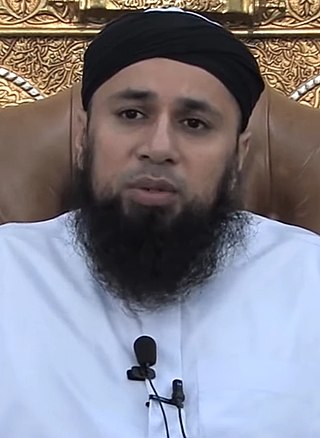
Riyadh ul Haq is a British Islamic scholar. He has been lecturing and teaching as the lead scholar at Al Kawthar Academy, Leicester since 2004.
Al-Mustafa Centre, officially Al-Mustafa Cultural and Educational Centre (AMCEC), is a community organisation based in Bradford, West Yorkshire, England.

Abdul Latif Chowdhury, widely known as Saheb Qiblah Fultali, was a late-twentieth century Bangladeshi Islamic scholar, mufassir, qāriʾ, poet and orator. As a prolific author, he completed several works in Arabic, Bengali and Urdu including Muntakhab as-Siyār and Anwar as-Sālikīn. His books are part of syllabic studies under the Bangladesh Madrasah Education Board. Fultali was the leading figure of the Islamic Arabic University movement and the demand for fazil and kamil qualifications to be recognised as bachelor's and master's degrees. He is the founder of several influential organisations and institutions in Bangladesh and the United Kingdom such as Anjumane Al Islah, Hazrat Shahjalal Darussunnah Yaqubia Kamil Madrasa and Madrasah-e-Darul Qirat Majidiah.
Abū Yaḥyā b. Muḥammad b. Zakariyyā, Zayn al-Dīn al-Sunaykī also known as Zakariyyā al-Ansārī was an Egyptian Sunni polymath. He is considered the leading specialist in fiqh, usul al-fiqh, hadith, usul al-hadith, tafsir, ulum al-Qur'an, Qu'ranic recitation, grammar, linguistic, rhetoric, philology, history, literature, genealogy, kalam, logic and Sufism. He also excelled in other sciences such as medicine, engineering, astronomy, and mathematics.

Jamia Islamia Obaidia Nanupur, popularly known as Nanupur Madrasah, is a famous Qawmi Jamiah. The Jamiah was established by Shah Sultan Ahmad Nanupuri in 1958. It is situated at Nanupur, Fatikchhari, Bangladesh. There are 5000 students at present in the Jamiah receiving education in various subjects and 80 well qualified teachers.
Darul Uloom Bolton is an Islamic private secondary school in Bolton, Greater Manchester, England.
Salman Husaini Nadwi is an Indian scholar and professor in the Islamic sciences. He is an author of numerous scholarly works in Arabic and Urdu. Salman Nadwi served as the Dean of the Faculty of Dawah at the Darul-uloom Nadwatul Ulama madrasa in Lucknow.
Ibrahim Memon Madani is an influential imam. who was born in Medina. He moved to England in 1980 where he completed his Hifz ul-Quran and Aalim course. In 1987, he was appointed imam of the mosque in Waterloo, Ontario and in 1991 he moved to Buffalo, New York with his father and brothers to establish the Darul-Uloom Al-Madania. He later established Darul-Uloom Canada in Chatham, Canada.

Masjid DarusSalam is a mosque in Lombard, Illinois, completed in 2013. The mosque is home to the DarusSalam Seminary, a national project which aims to educate the Islamic community in the traditional Islamic sciences.

Darul Uloom Jamia Nizamia Ghousia is an Islamic seminary for Sunni Muslims. It was established by Mohammad Abdul Ghafoor Hazarvi, where he served as the Mohatmim and Grand Mufti. His son Mufti Abdul Shakoor Hazarvi took over as Mohatmim until April 2010. The Jamia is known for the great Ulama and Huffaz of Quran and Hadith it produced. It continues the tradition of the Darul uloom system initiated by Darul Uloom Bareily.

Idris Kandhlawi was a Pakistani Sunni scholar during the mid-twentieth century, widely recognized for his contributions to various fields of Islamic studies, including hadith, Quranic studies, Islamic jurisprudence, Prophetic biography, and theology. Holding the titles of Sheikh al-Hadith and Sheikh al-Tafsir, he traced his lineage to Abu Bakr on his father's side and Umar on his mother's side. He studied in Thana Bhawan under Ashraf Ali Thanwi. He studied hadith, first at Mazahir Uloom under Khalil Ahmad Saharanpuri, and later at Darul Uloom Deoband under Anwar Shah Kashmiri. He started his professional career at Madrasa Aminia and later e went to Darul Uloom Deoband. In 1929 he took a position in Hyderabad State, where he had access to the Asafia Library. This experience enabled him to produce a five-volume Arabic commentary on Mishkat al-Masabih titled Al-Taleeq al-Sabeeh, of which the first four volumes were published in Damascus. His scholarly work garnered recognition in the Arab world. He later assumed the roles of Sheikh al-Tafsir at Darul Uloom Deoband and Sheikh al-Hadith wa al-Tafsir at Jamia Ashrafia. In addition, he served as the Chancellor of Islamia University of Bahawalpur during its tenure as Jamia Abbasia.
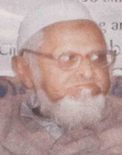
Zafeeruddin Miftāhi was an Indian Muslim scholar and jurist who served as a Mufti of Darul Uloom Deoband and the second president of Islamic Fiqh Academy. He compiled the religious verdicts of Azizur Rahman Usmani, called the Fatāwa Darul Uloom Deoband in twelve volumes and wrote books including Islām Ka Nizām-e-Masājid, Islām Ka Nizām Iffat-o-Asmat and Tārīkh-e-Masājid.
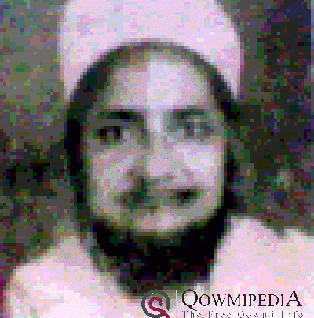
Mushāhid Aḥmad Bāyampūrī was a Pakistani Bengali Muslim theologian, teacher, writer and politician. He was a member of the 3rd National Assembly of Pakistan as a representative of Sylhet-II.
Mufakkir al-Islām Ḍiyā' ad-Dīn ibn Muqaddas ʿAlī, better known simply as Zia Uddin or reverentially as Nazim Saheb Huzur, is a Bangladeshi Deobandi Islamic scholar, politician and educationist. He is currently the president of Jamiat Ulema-e-Islam Bangladesh and Azad Dini Adarah-e-Talim, and an advisor to Hefazat-e-Islam Bangladesh. Uddin is also the director of Jamia Madania Angura-Muhammadpur and a member of Al-Haiatul Ulya Lil-Jamiatil Qawmia Bangladesh's permanent committee. He has played important roles in the 2013 Shapla Square protests and Khatme Nabuwwat movement, and has spoken out against the construction of the Tipaimukh Dam.
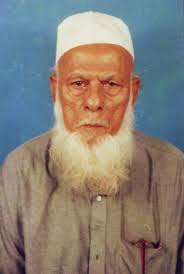
Ashraf Ali Bishwanathi (1928–2005) was a Bangladeshi Deobandi Islamic scholar, educator, politician and religious writer. He was called "Baba-e Jamiat" in order to lay the foundation of Jamiat Ulema-e-Islam Bangladesh in East Pakistan and present day Bangladesh. He was also the president of the party for 2001 to 2005. He was also the founder of Jamia Islamia Darul Uloom Madania Bishwanath, Madania Qawmia Mahila Madrasa and the literary magazine Monthly Al Farooq.
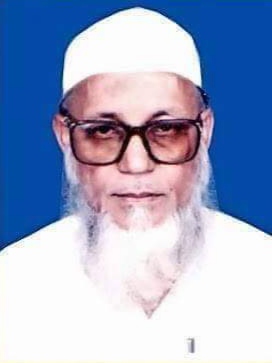
Shamsuddin Qasemi was a Bangladeshi Islamic scholar, politician, author and educationist. He was the founding president of the Khatme Nabuwwat Andolan Council, former secretary-general of Jamiat Ulema-e-Islam Bangladesh, former principal of Jamia Madania Chittagong and Jamia Hussainia Arzabad, and the founding chief-editor of the monthly Paygam-e-Haqq and weekly Jamiat magazines. He is also noted for his contributions during the Bangladesh Liberation War of 1971.












